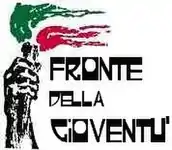Youth Front (Italy)
The Youth Front (Italian: Fronte della Gioventù, FdG) was the youth wing of the Italian Social Movement from 1971 to 1996.
| Youth Front Fronte della Gioventù | |
|---|---|
 | |
| Founded | 1971 |
| Dissolved | 1996 |
| Ideology | Neo-fascism Italian nationalism National conservatism Factions: |
| Mother party | Italian Social Movement |
History

At the beginning of the 70s Massimo Anderson and Pietro Cerullo, brought together the main right-wing youth movements of the time, namely the Young Italy and the "Students and Workers Youth Rally", in a new political entity called "Youth Front", with Anderson as secretary and Cerullo as president.[1] The national council of the FdG took office on 6 September 1971.
As for many other organizations of the time that did not have a political line based solely on the institutional sphere, the Youth Front measured itself against the political violence that marked the so-called "Years of Lead". The violent dimension of the political clash that involved the militants of the FdG with the opposing political forces, in particular those of the extra-parliamentary Left, caused the death of many activists on the right and left, including the militants of the FdG militants killed in the Acca Larentia massacre.[2]
In 1996, after the transformation of the Italian Social Movement into National Alliance, the Youth Front also changed its name and became Youth Action.[3]
National secretaries
- Massimo Anderson (1971–1977)
- Franco Petronio (regent) (1977)
- Gianfranco Fini (1977–1988)
- Gianni Alemanno (1988–1991)
- Riccardo Andriani (1991–1993)
- Giuseppe Scopelliti (1993–1995)
- Regency Committee (1995–1996)
- Basilio Catanoso (1996)
See also
- Groupe Union Défense
- Federation of Nationalist Students
- FUAN
- Alternative right-wing music (Italy)
- Campo Hobbit
References
- La fiamma e la celtica, Nicola Rao
- "Roma, una strage lunga 40 anni: per Acca Larenzia i morti furono sette" [Rome, a 40-year-long massacre: seven people died at Acca Larenzia]. Secolo d'Italia. 7 January 2018. Archived from the original on 19 June 2018.
- "AN: Muoiiono FUAN e FDG, Nasce 'Azione Giovani'" [AN: FUAN and FDG Die, 'Young Action' is Born] (in Italian). Adnkronos. 6 September 1996. Archived from the original on 14 February 2021.